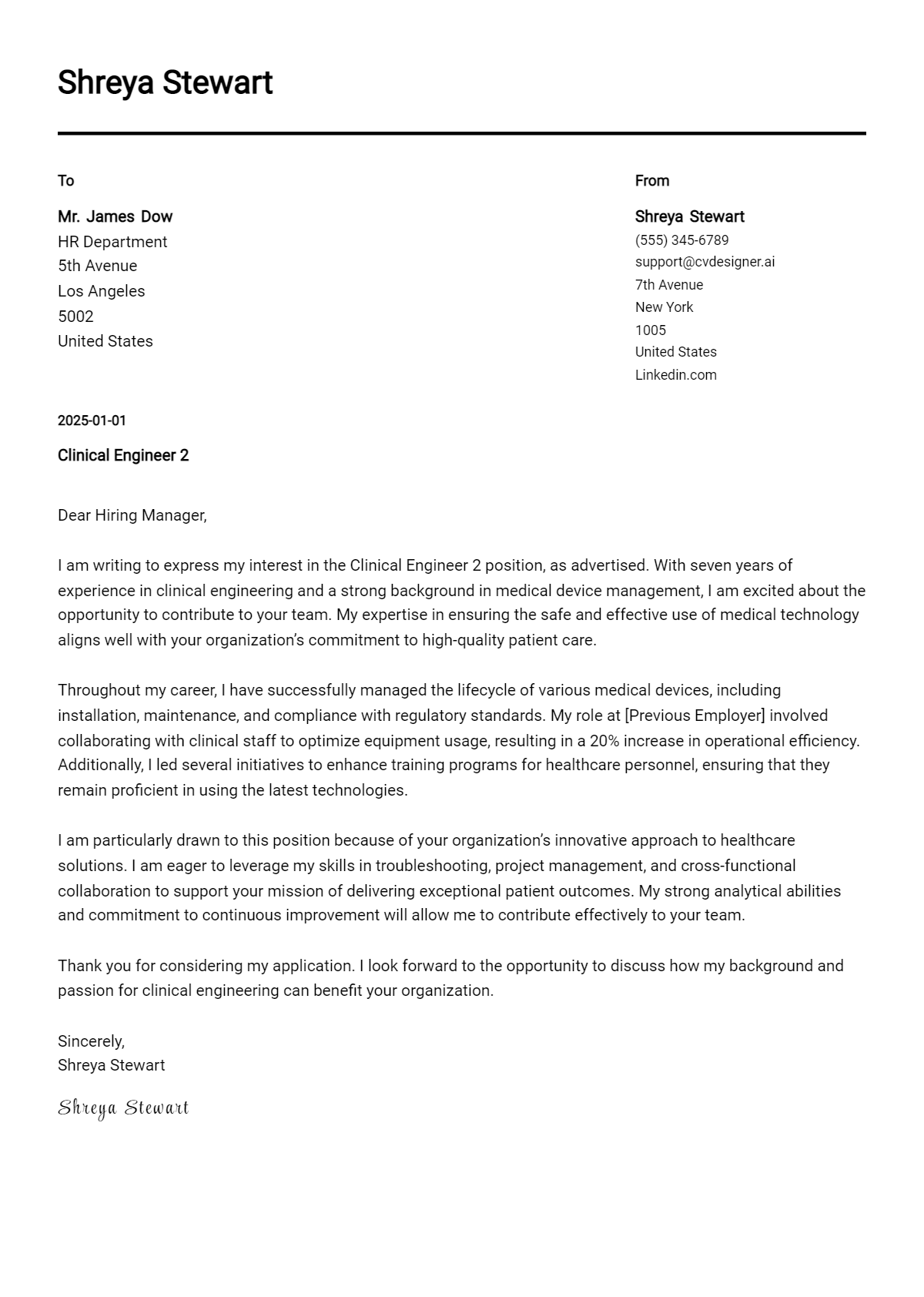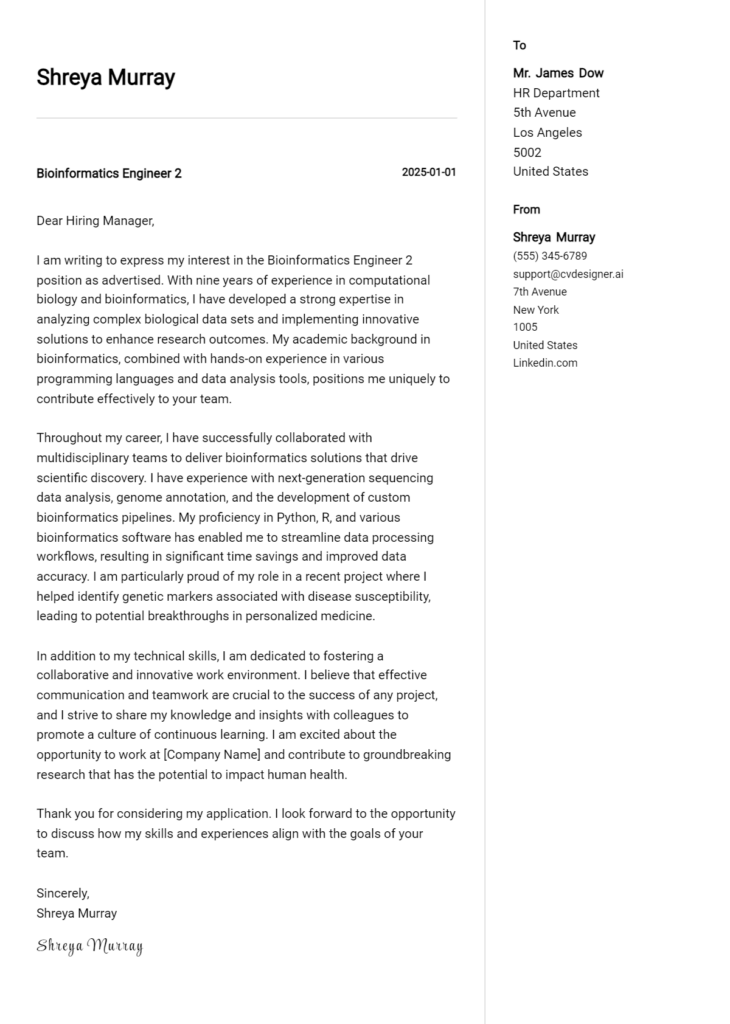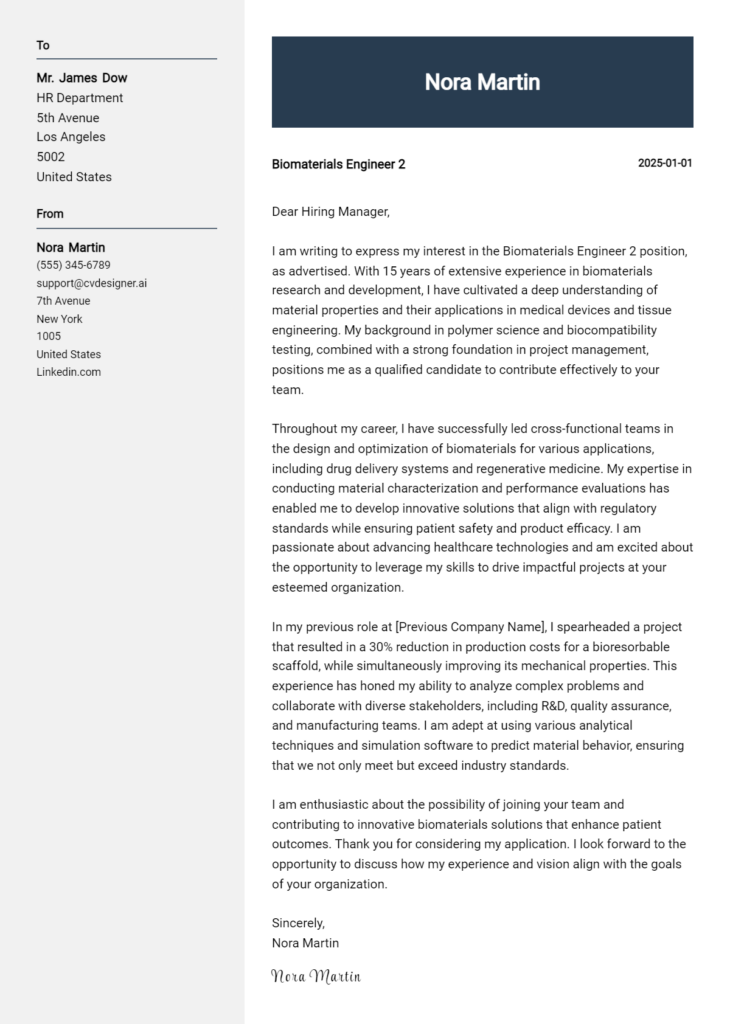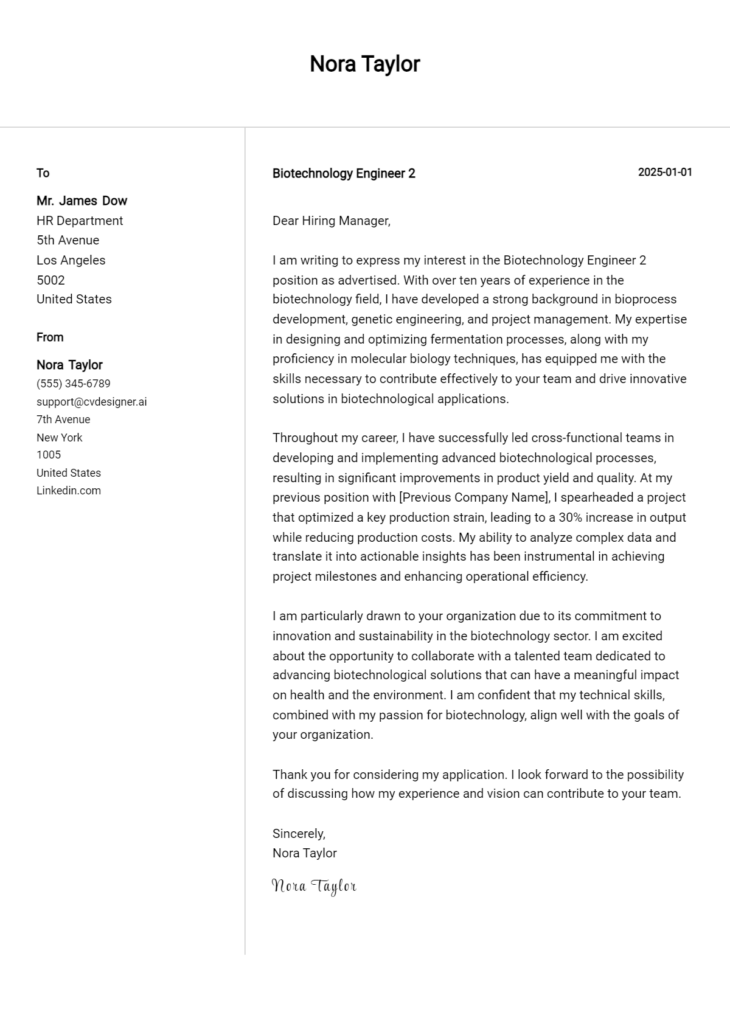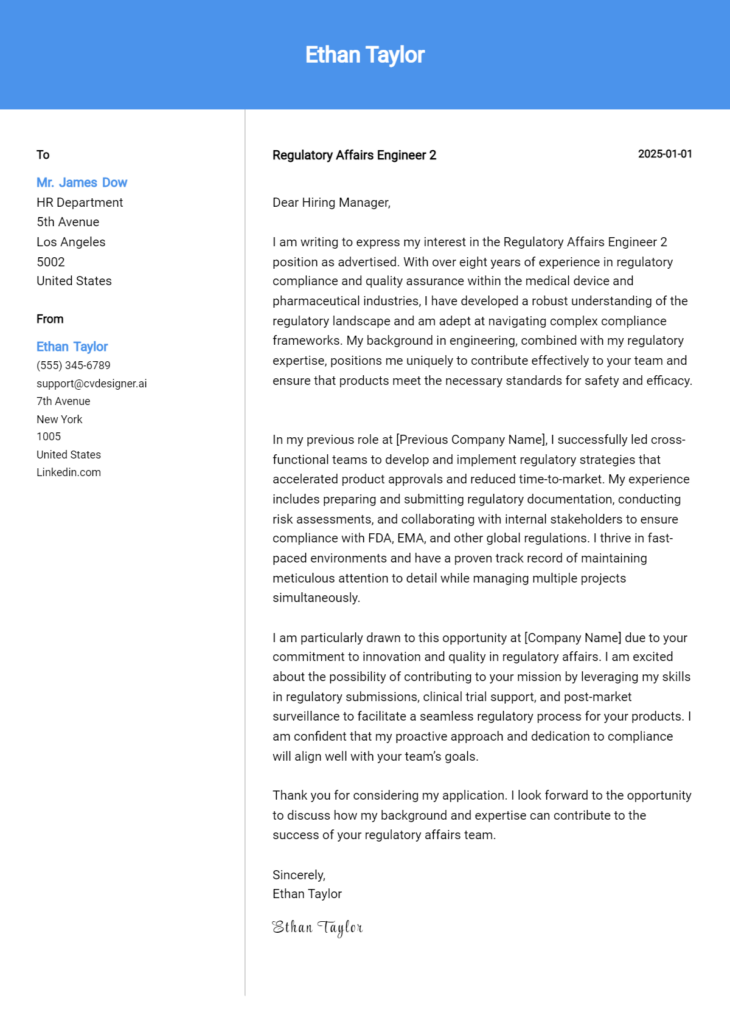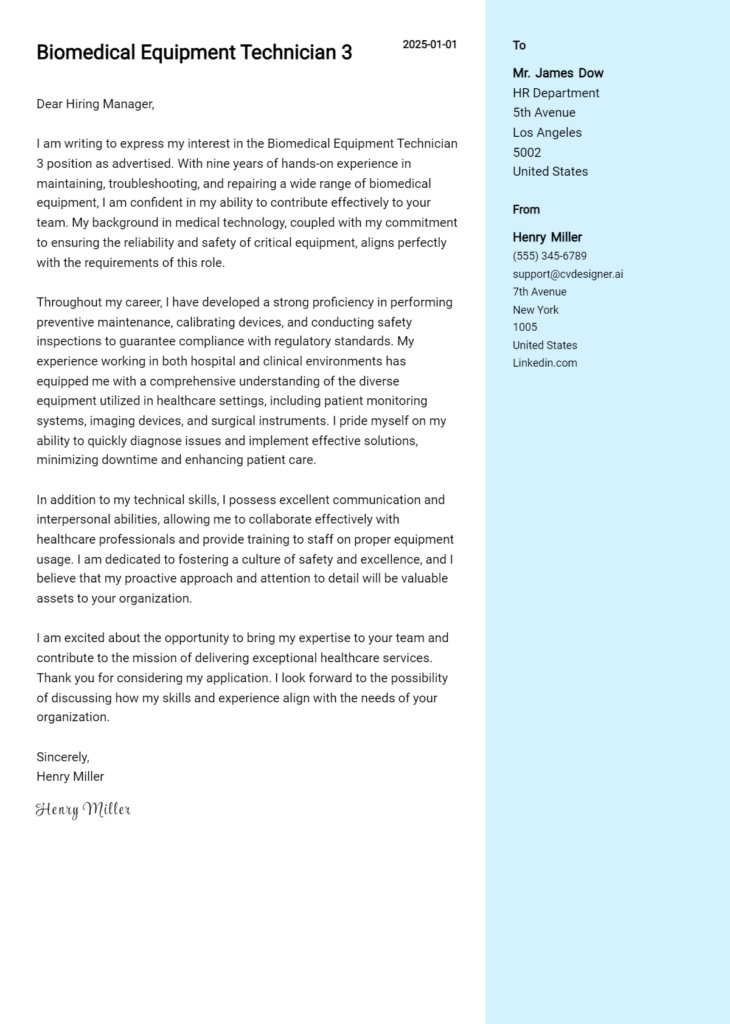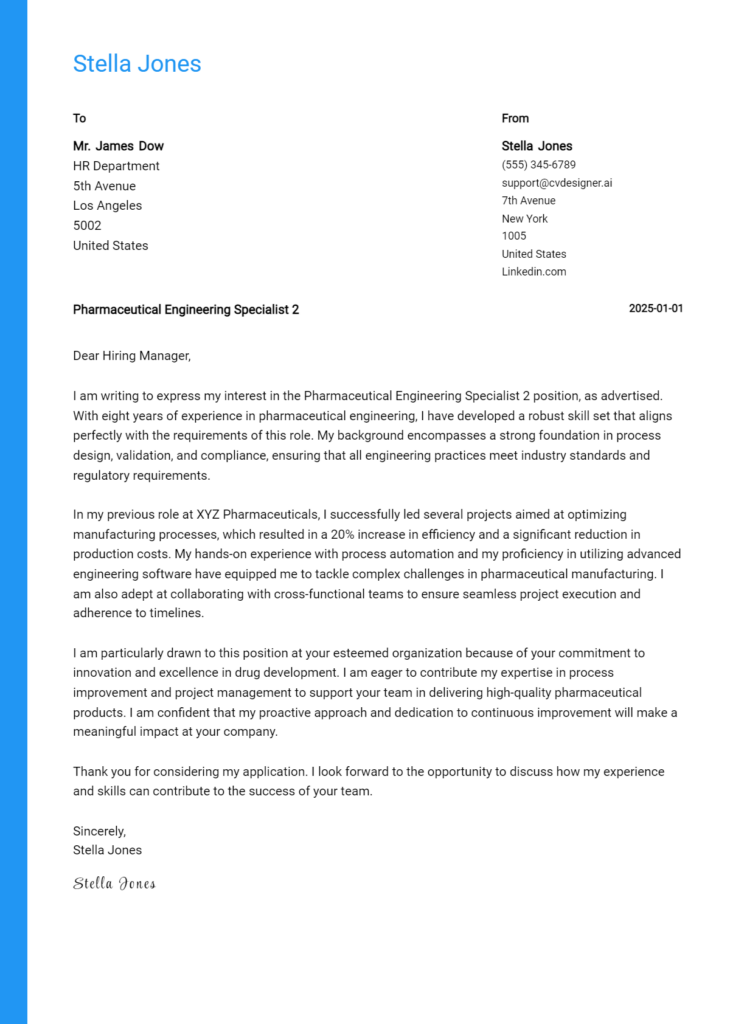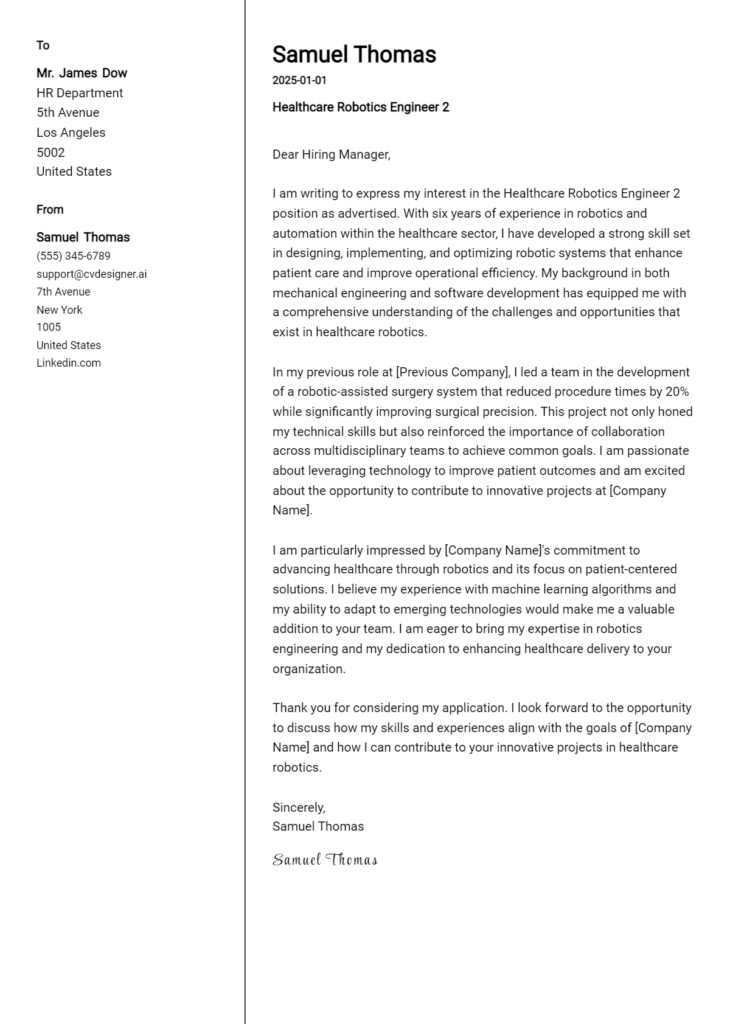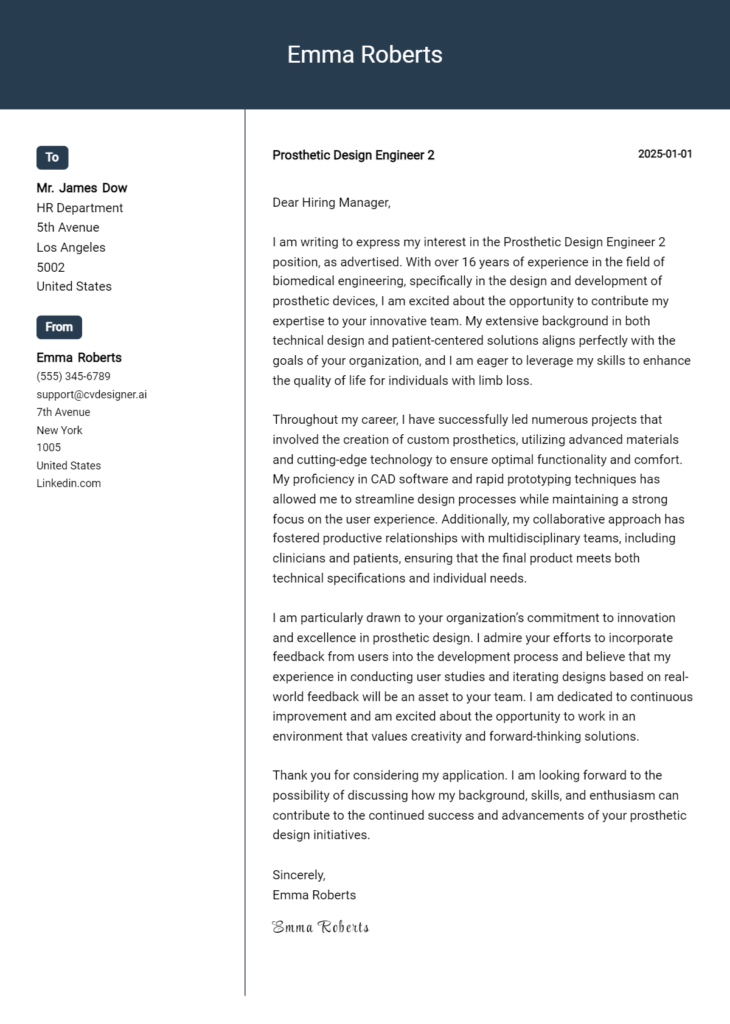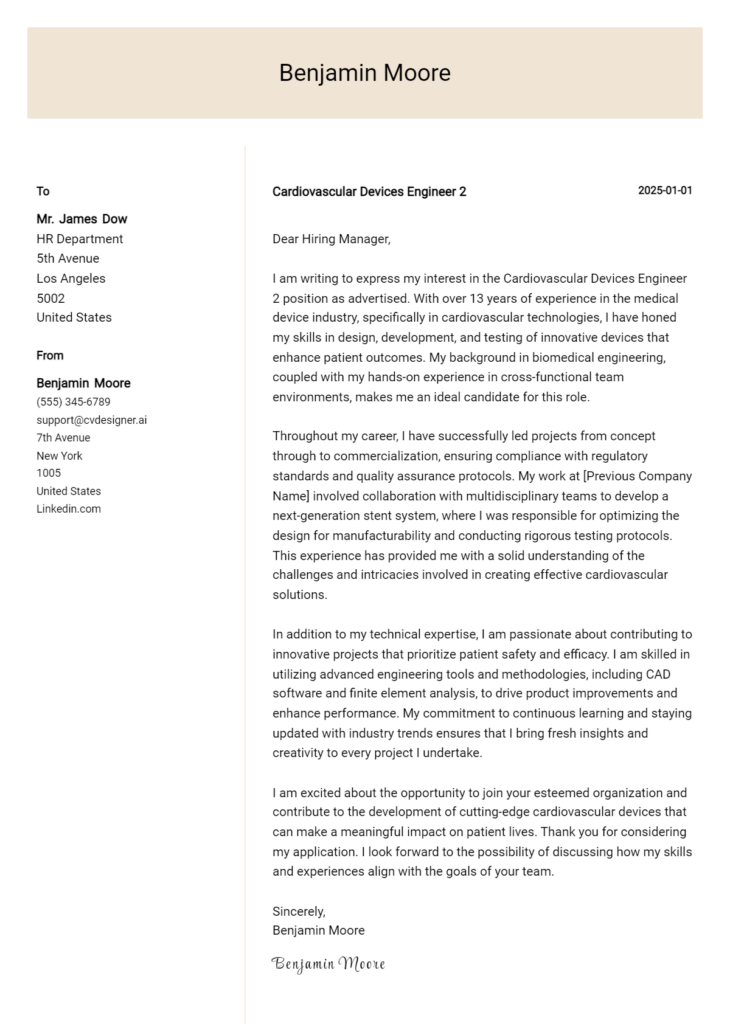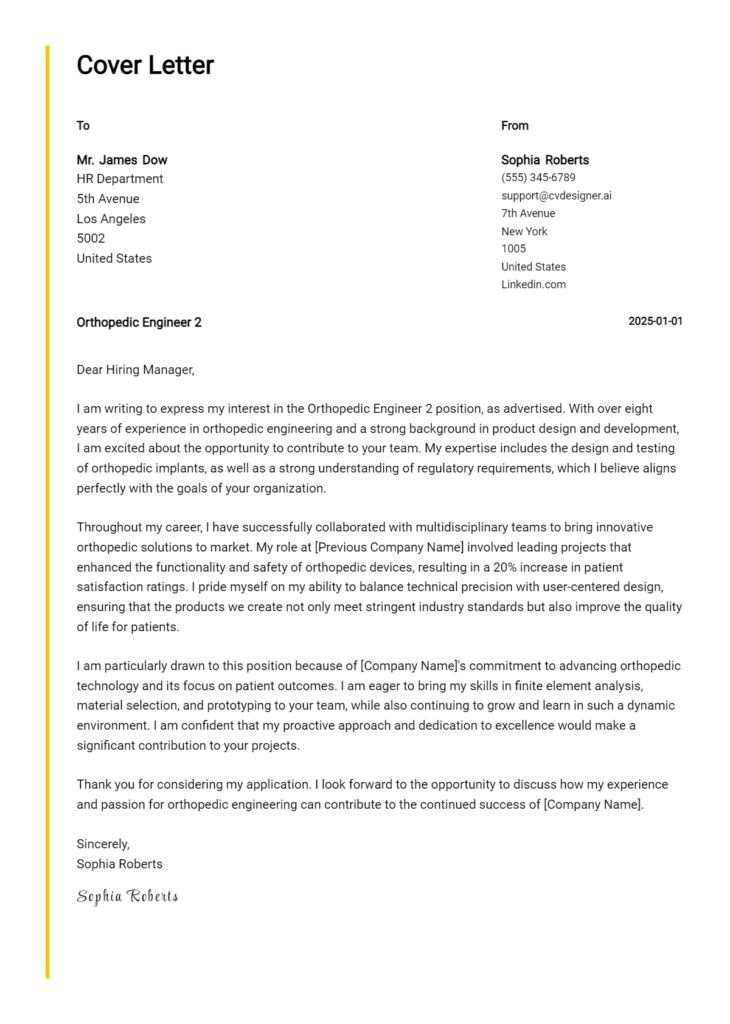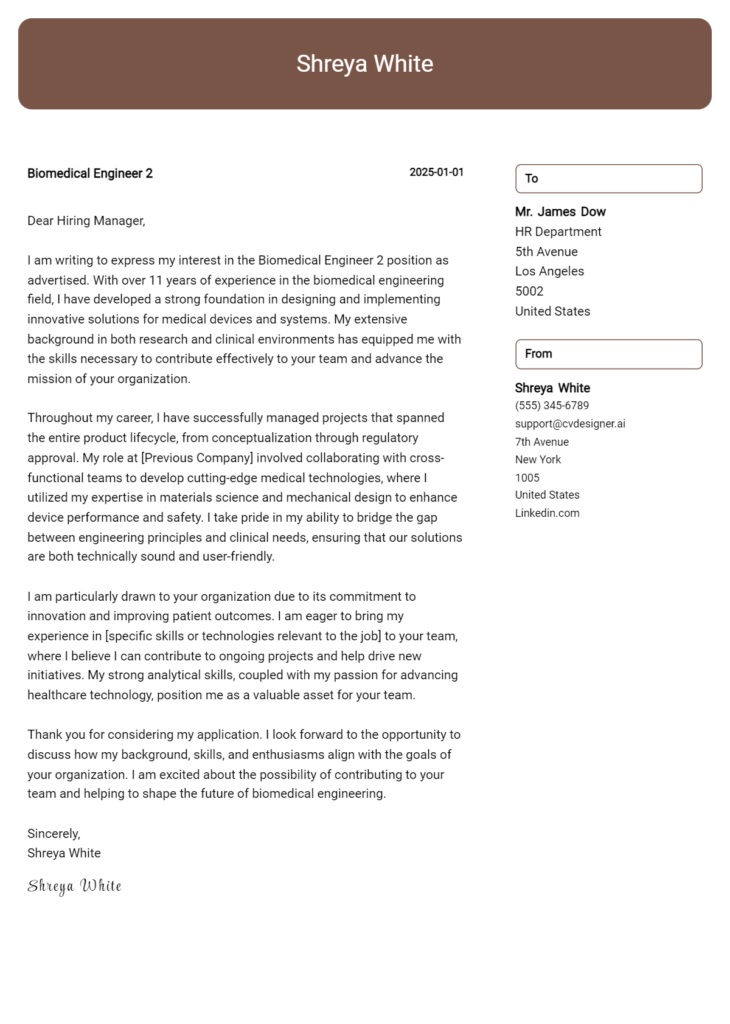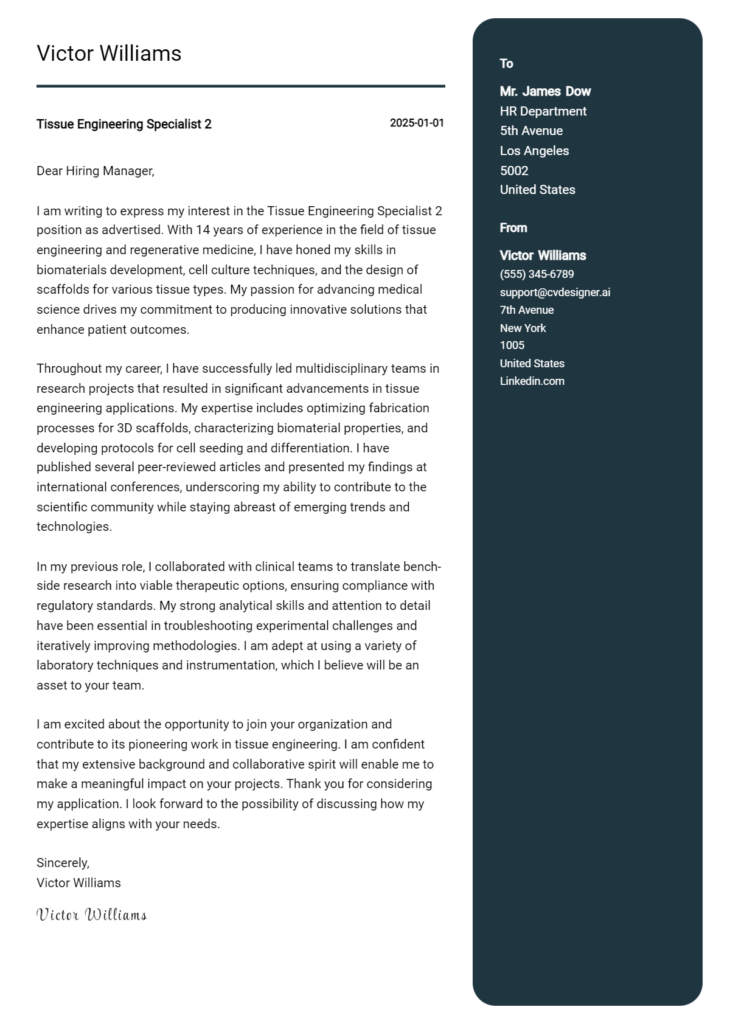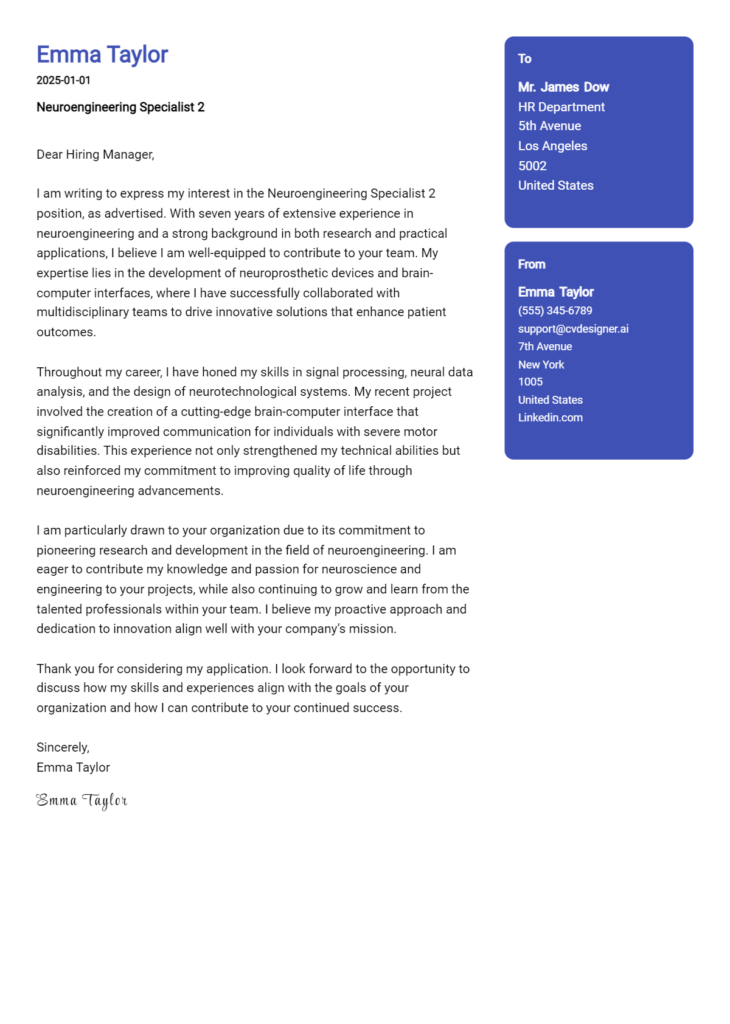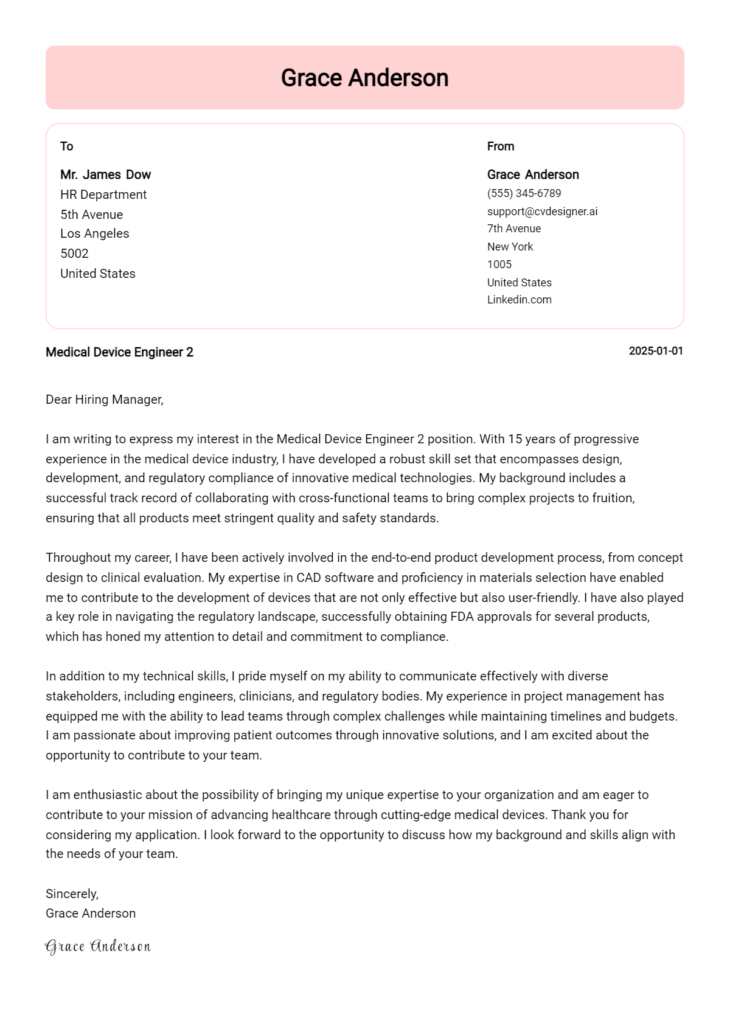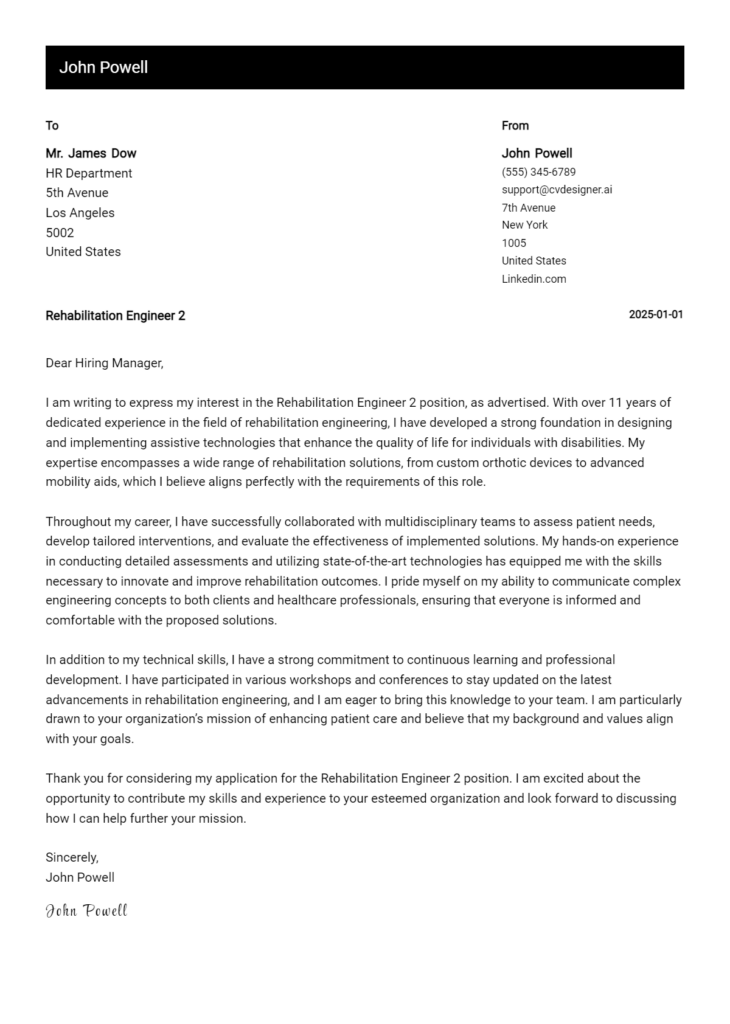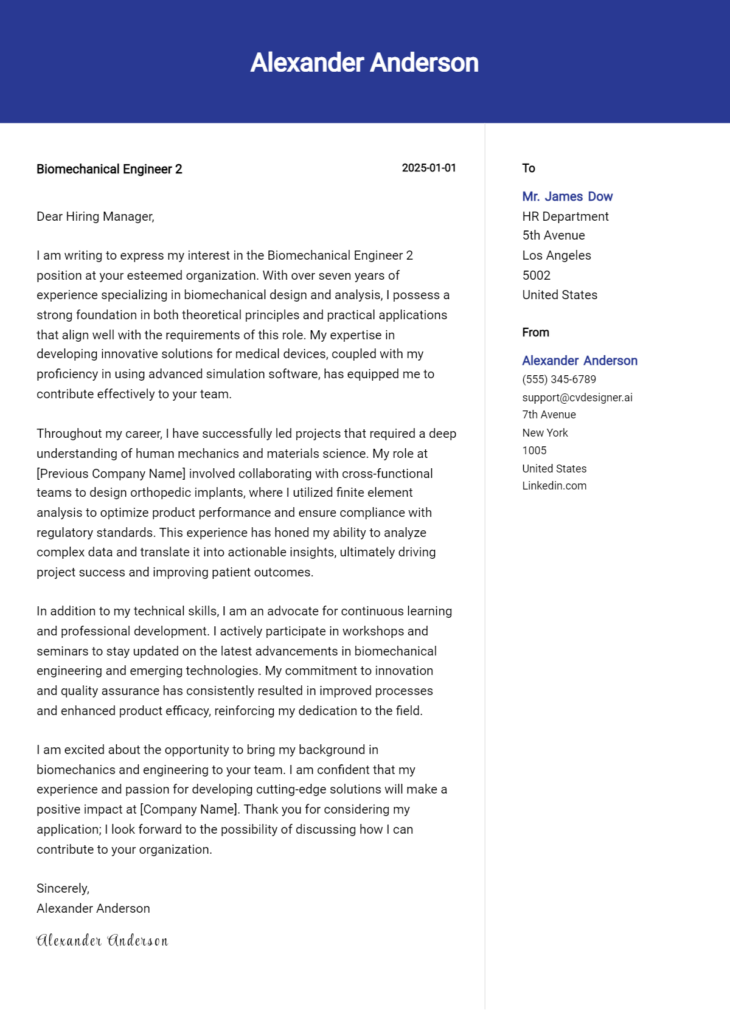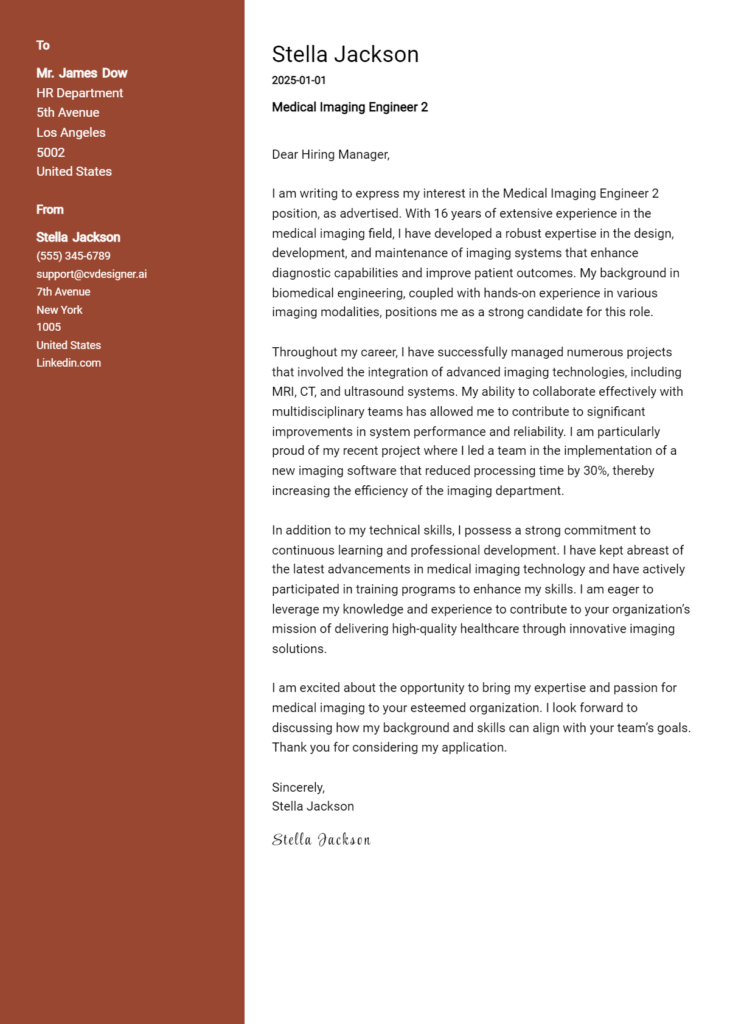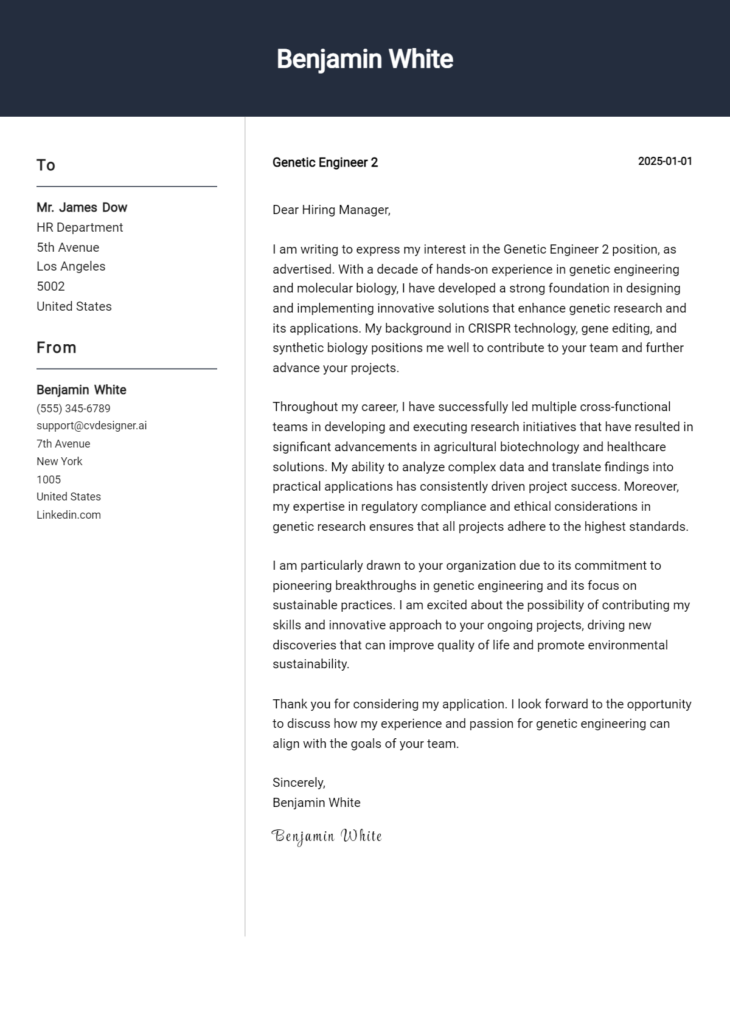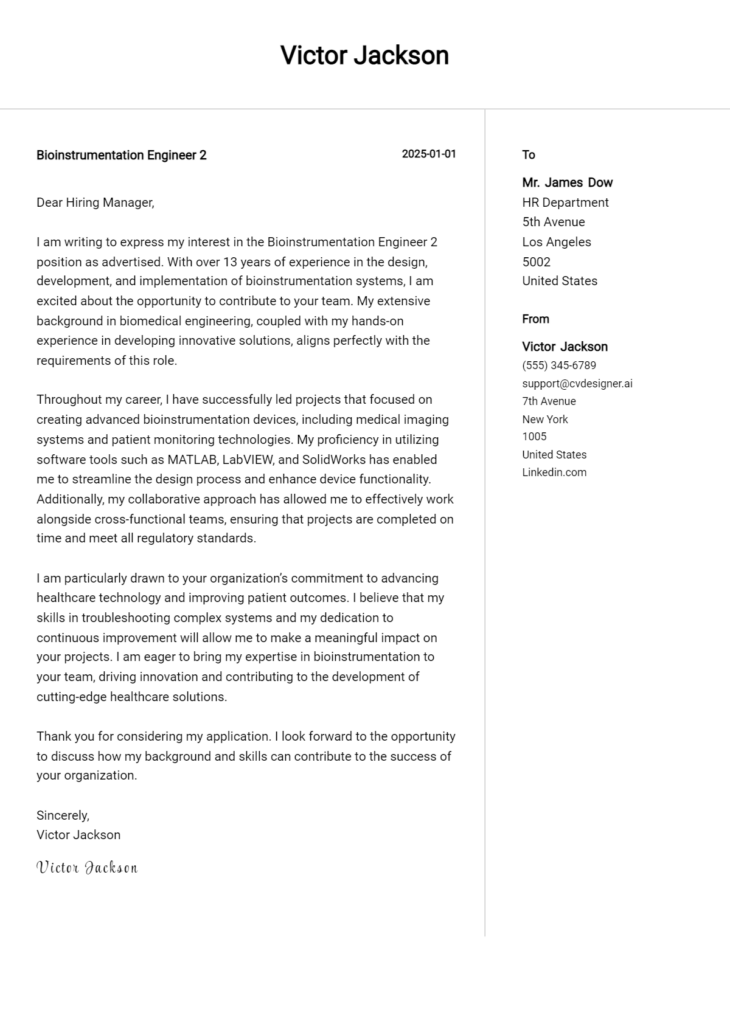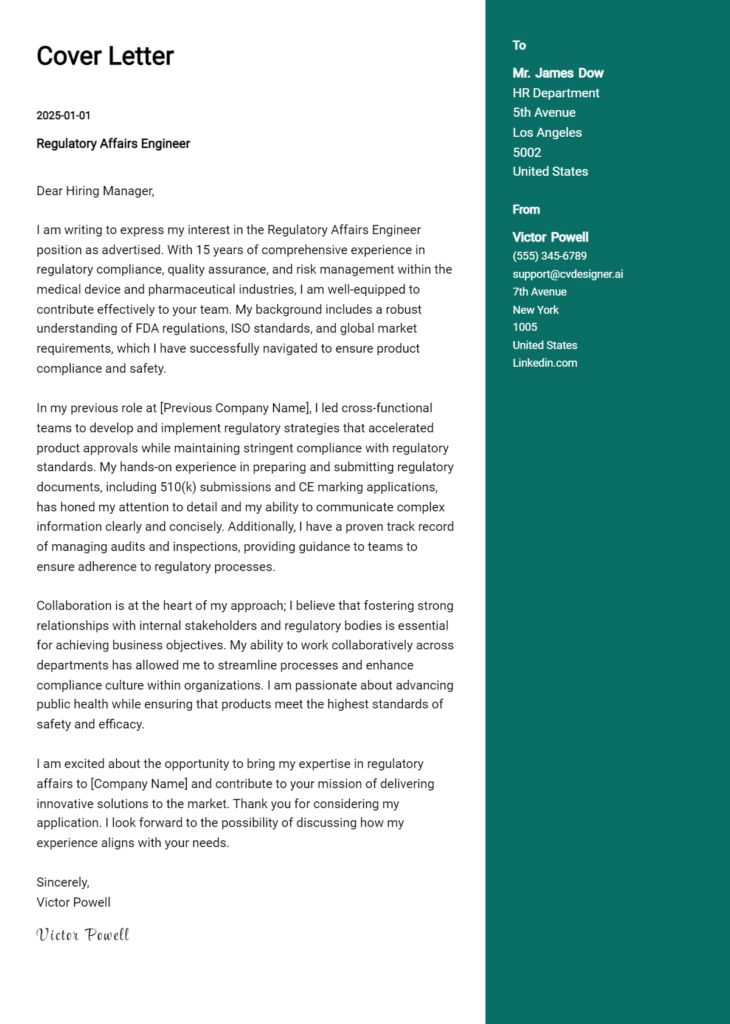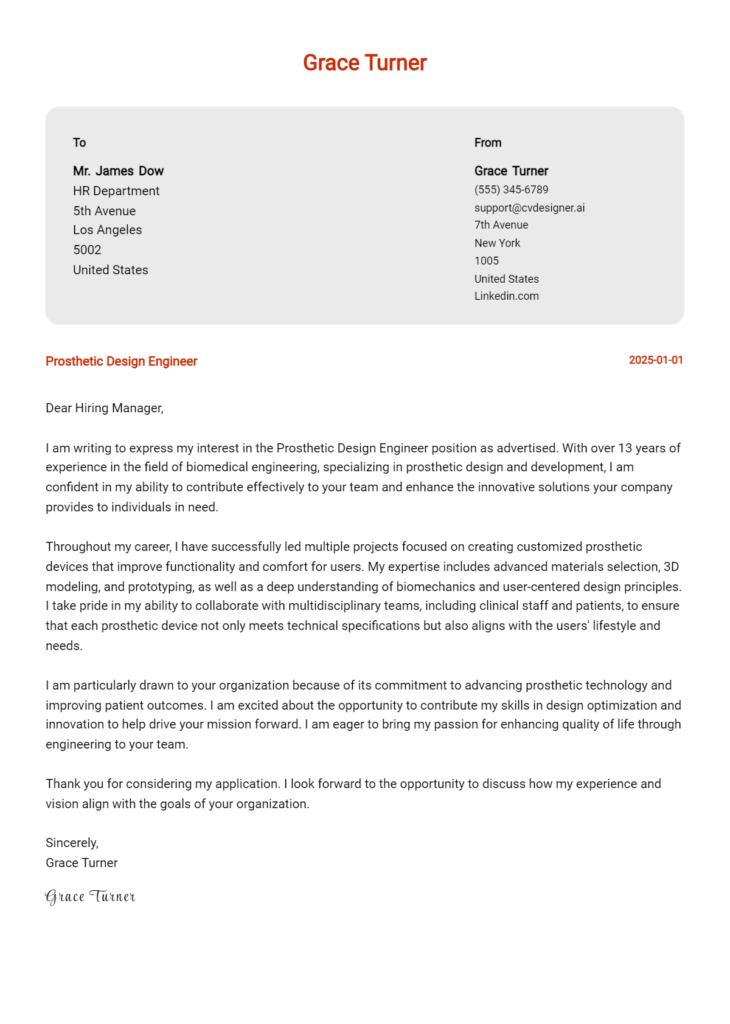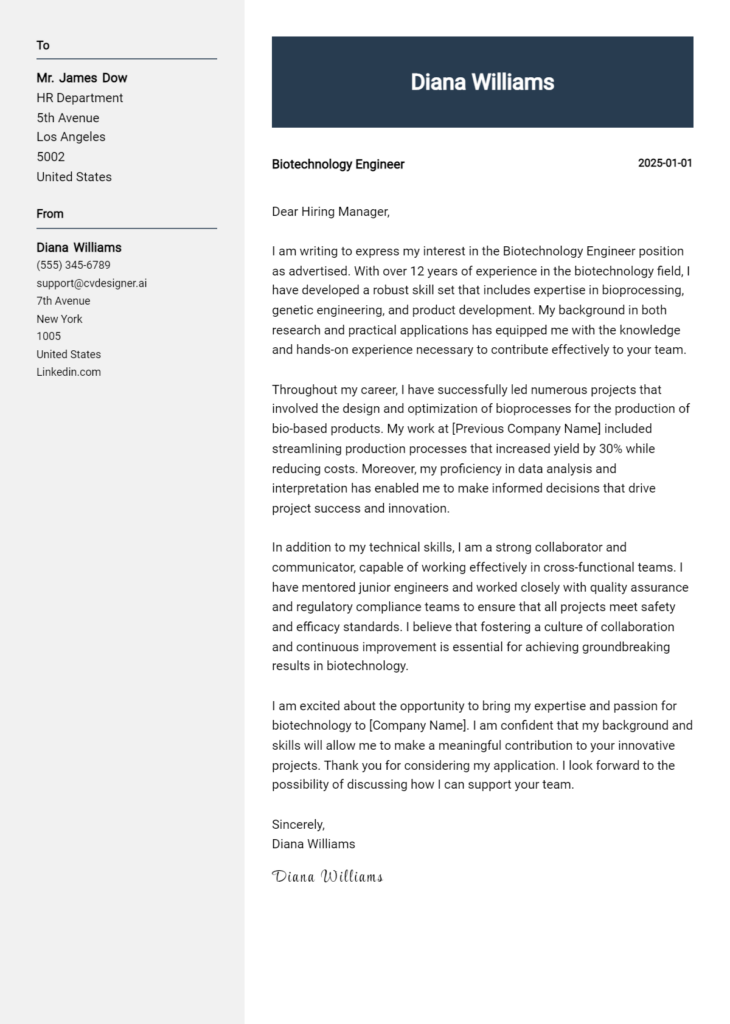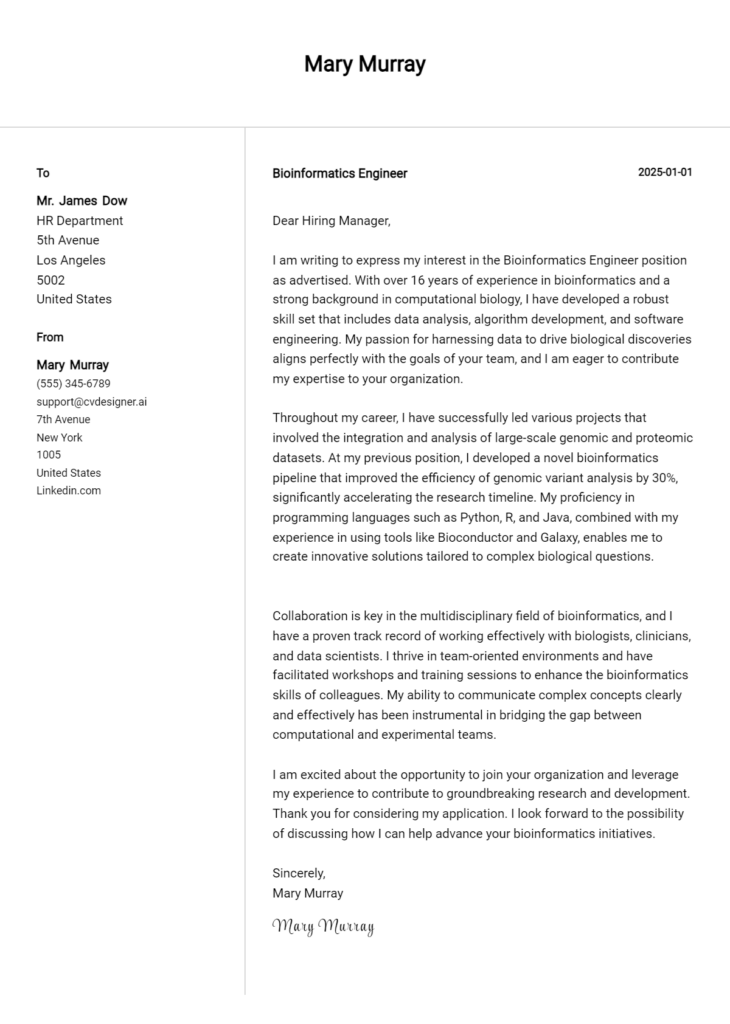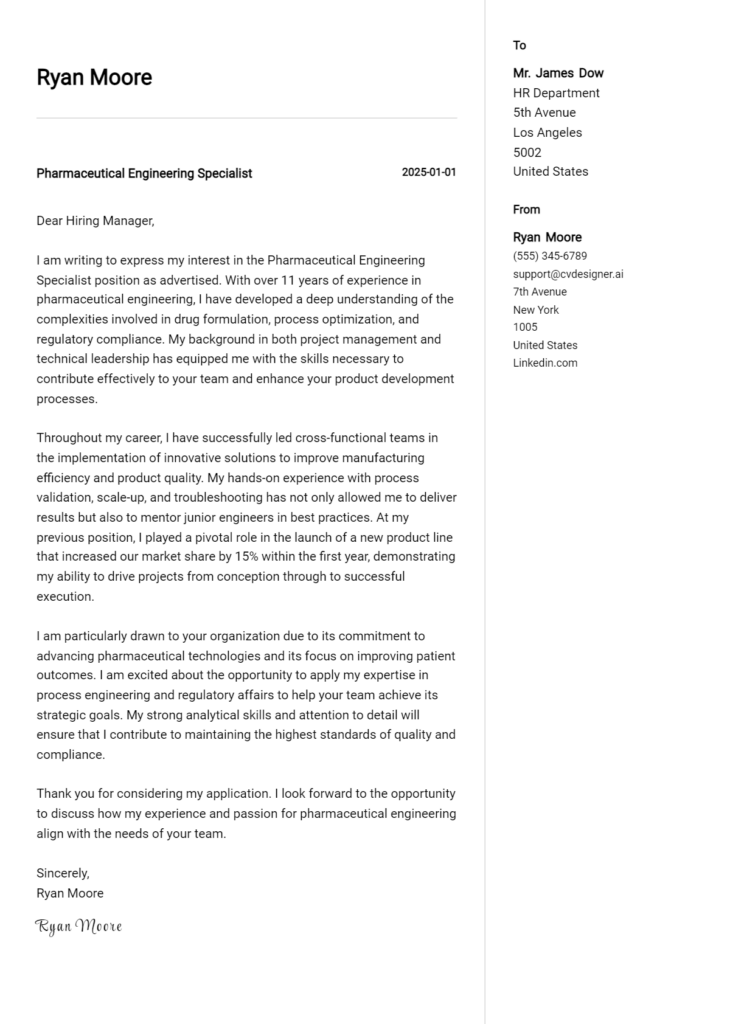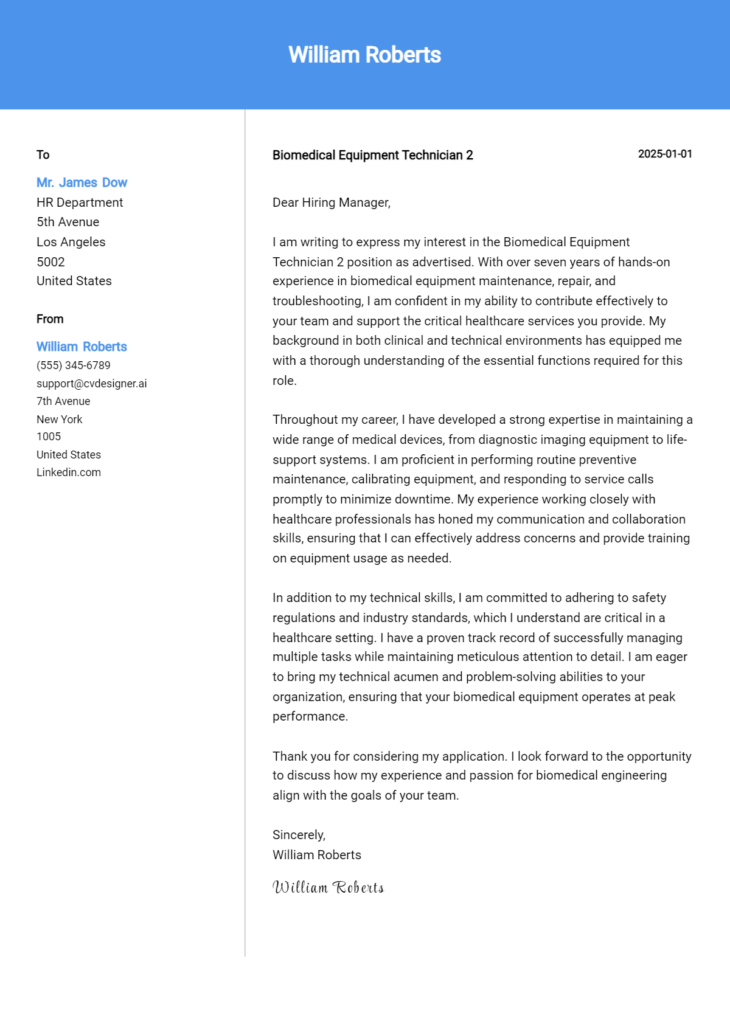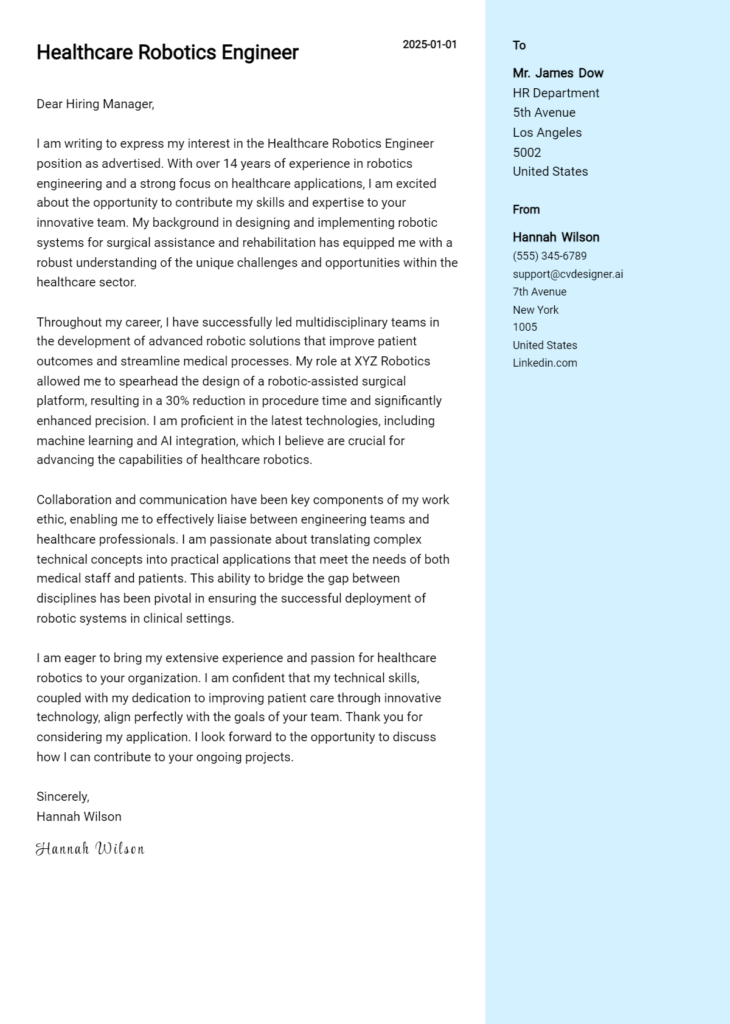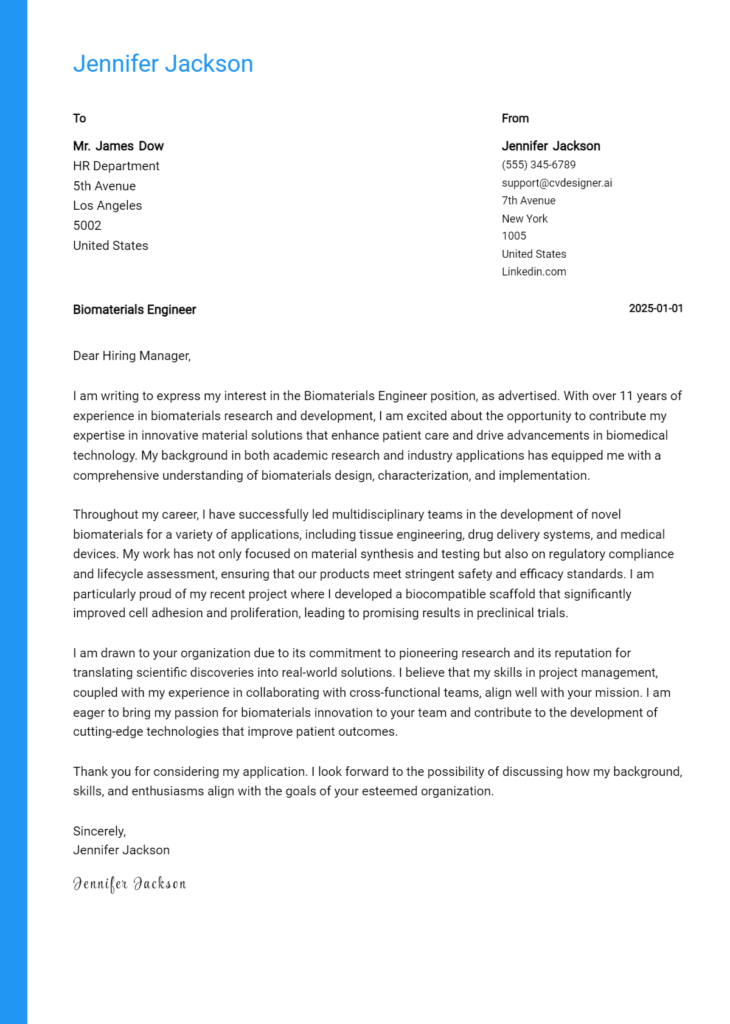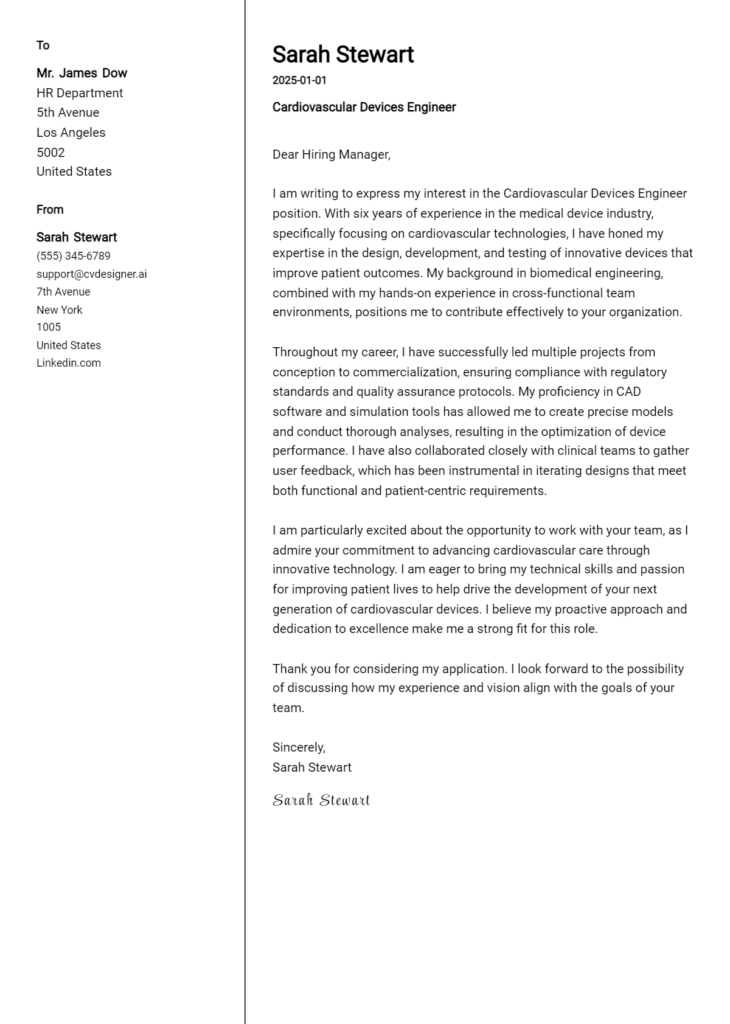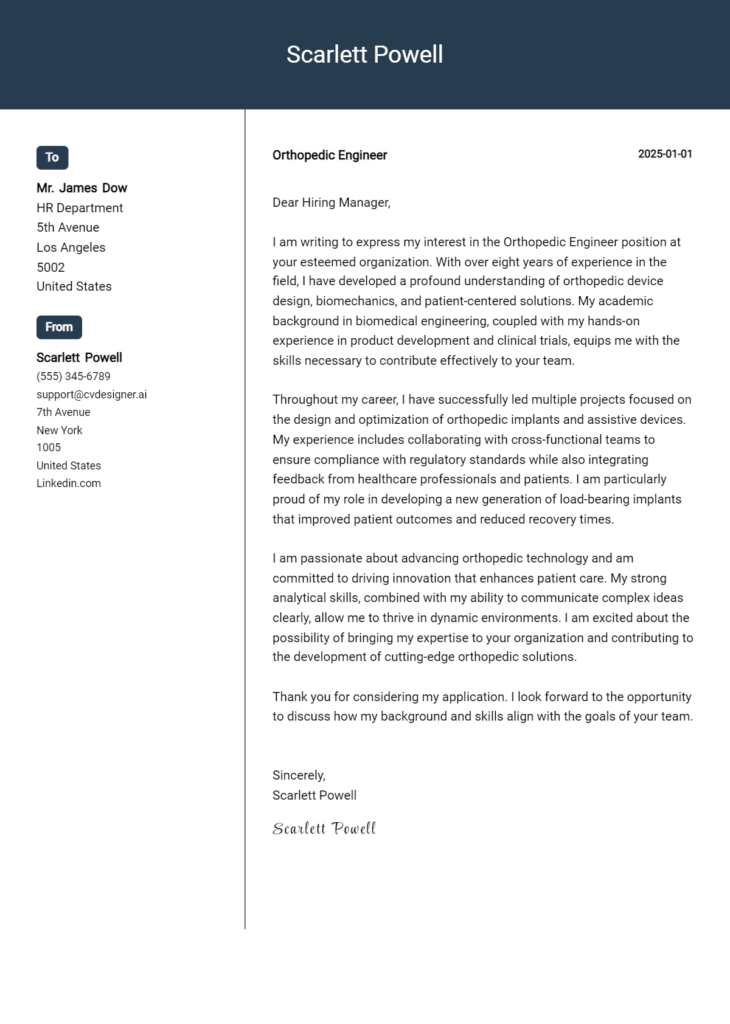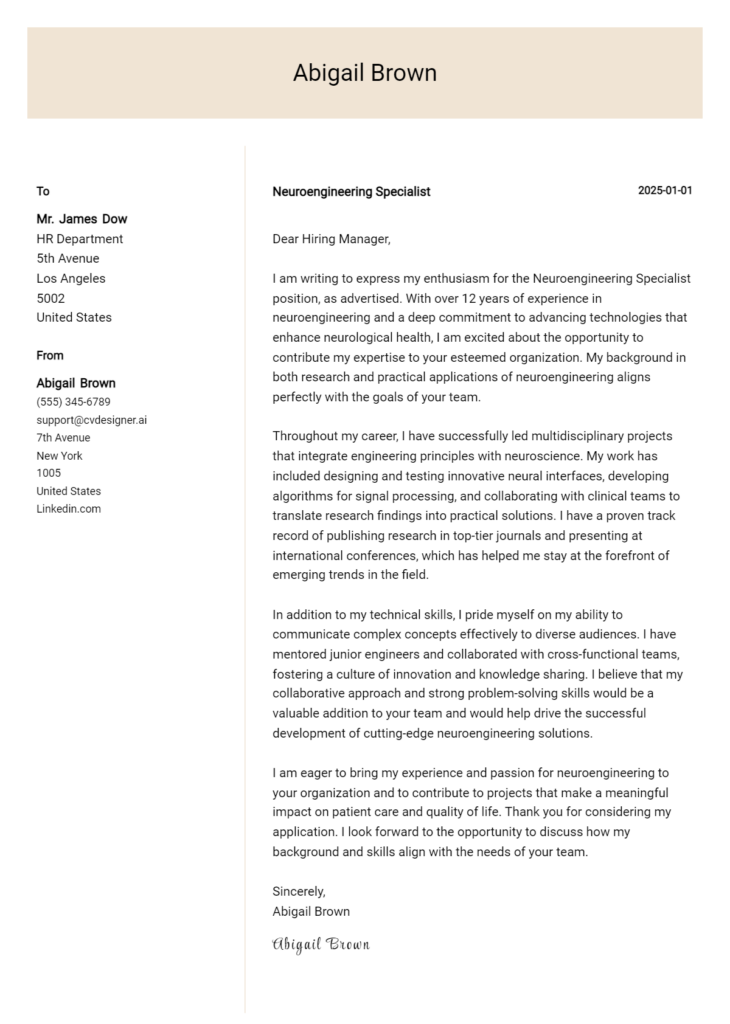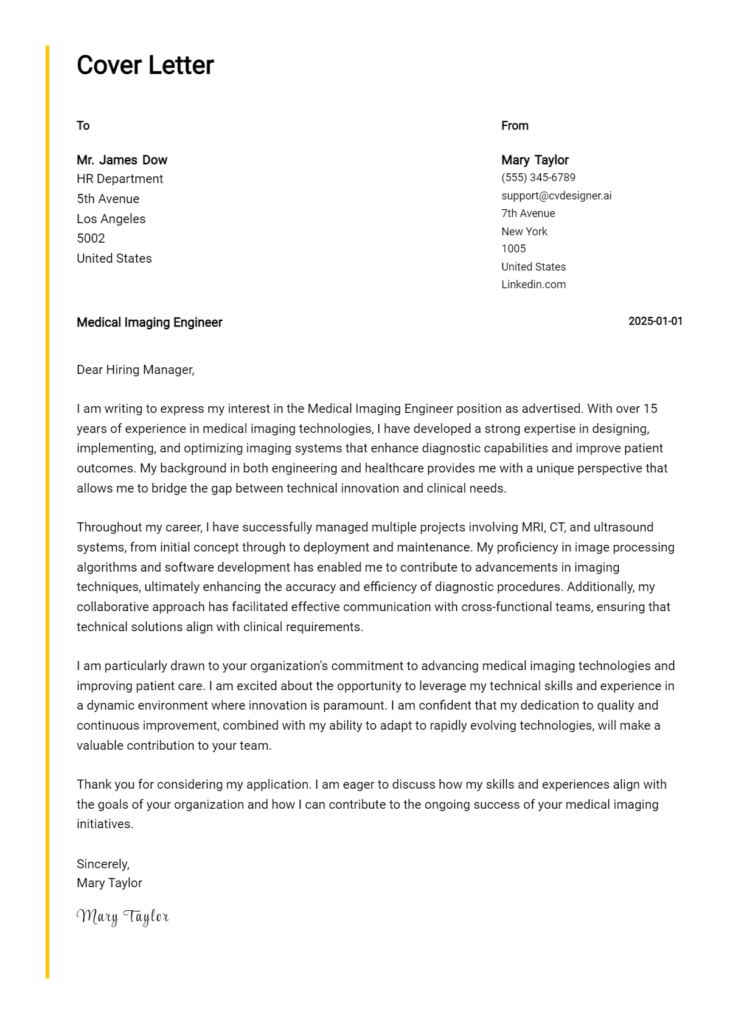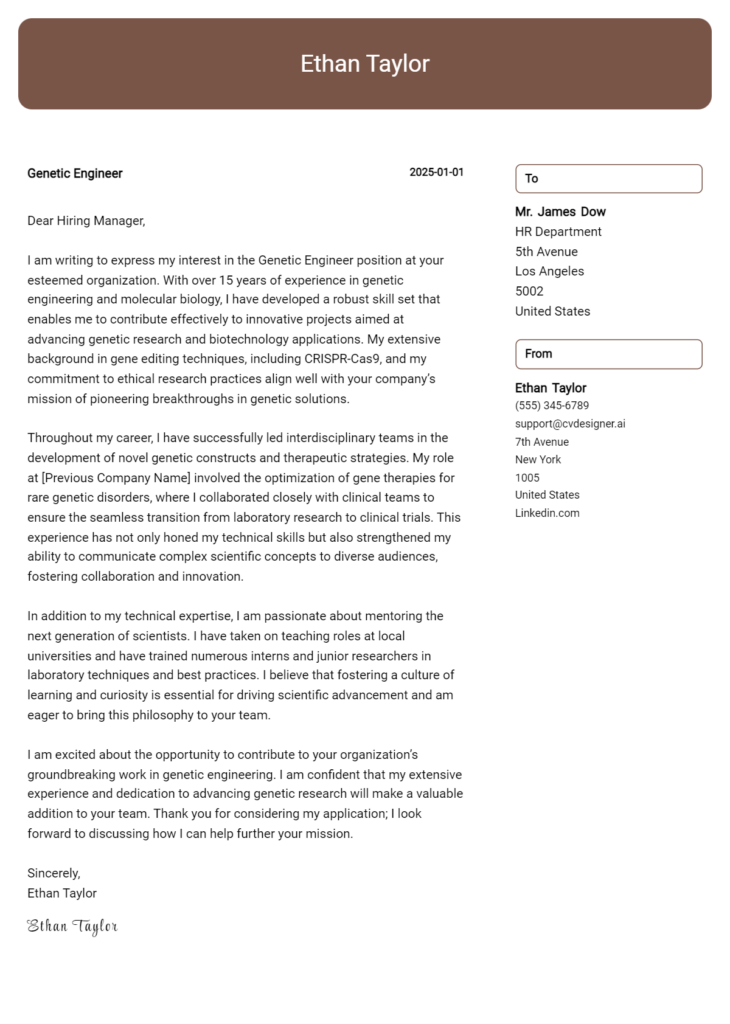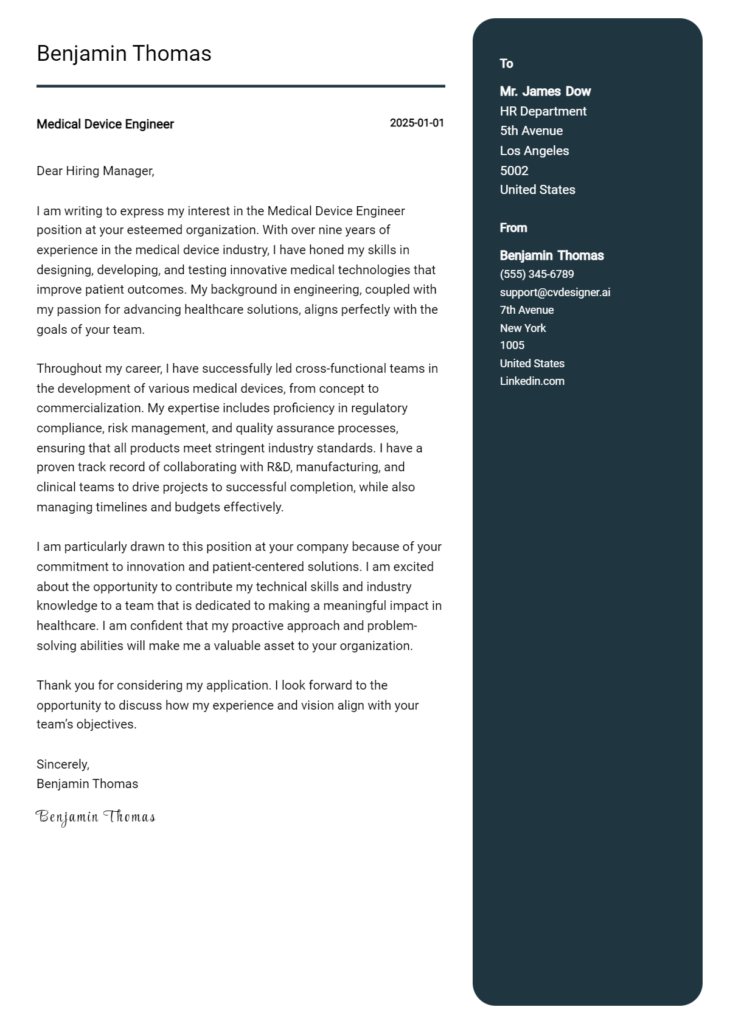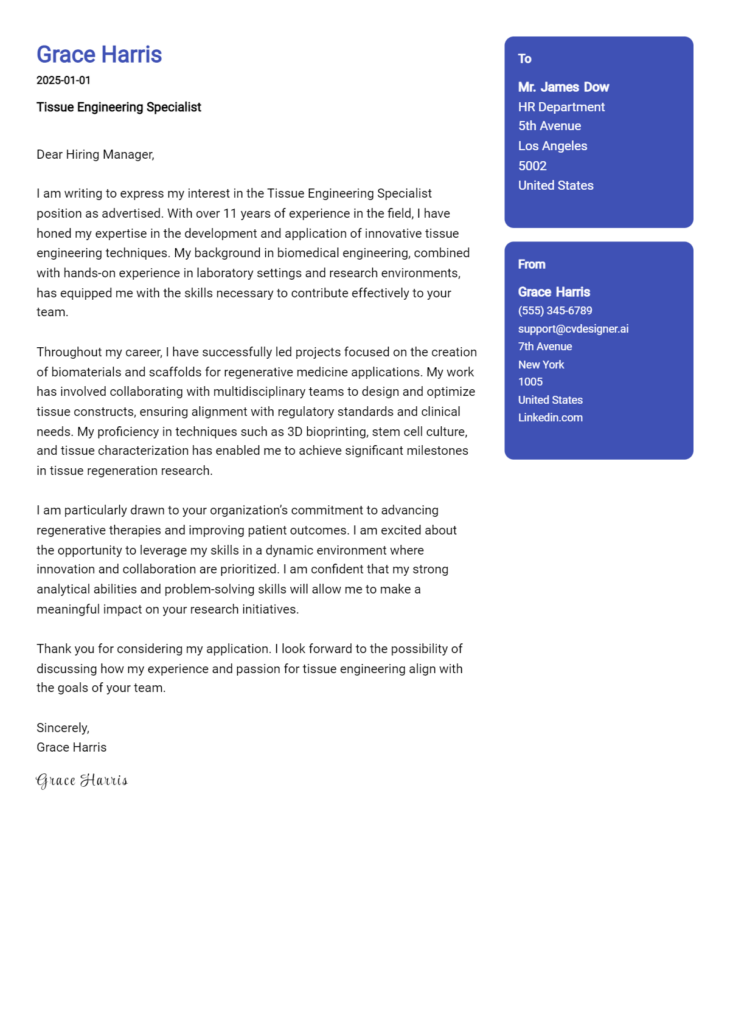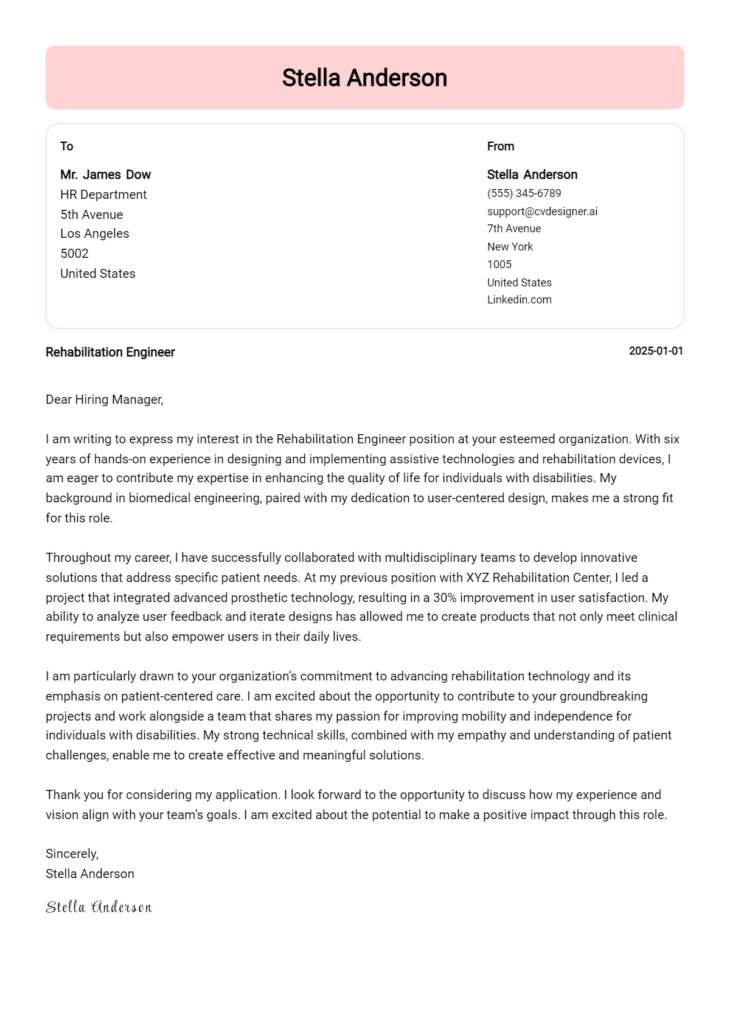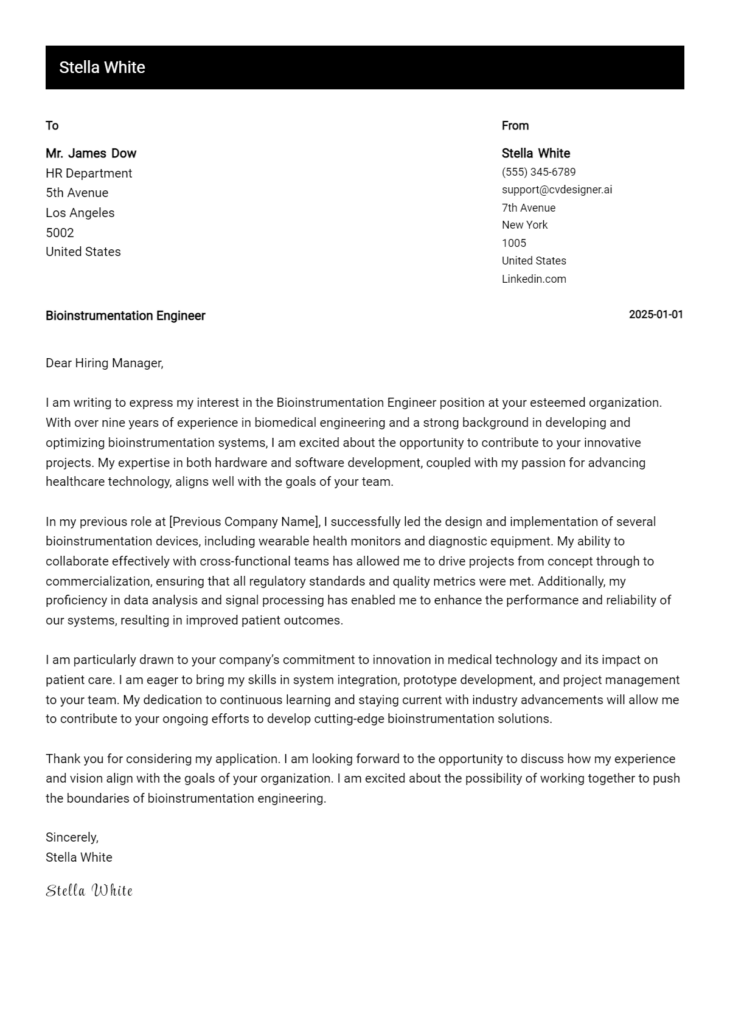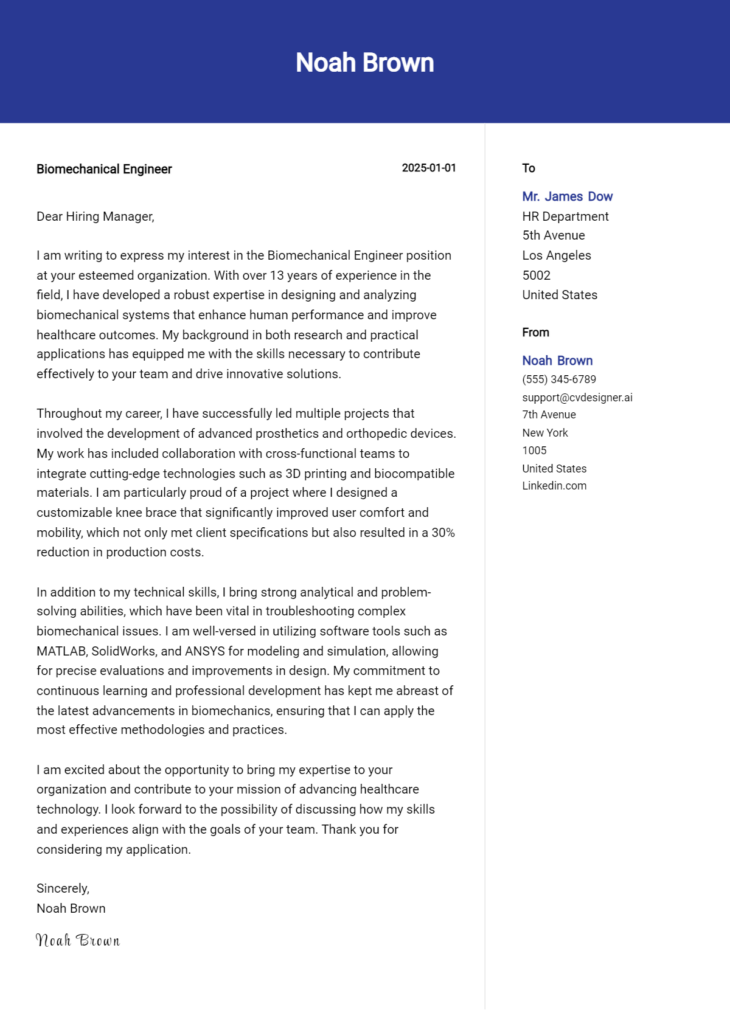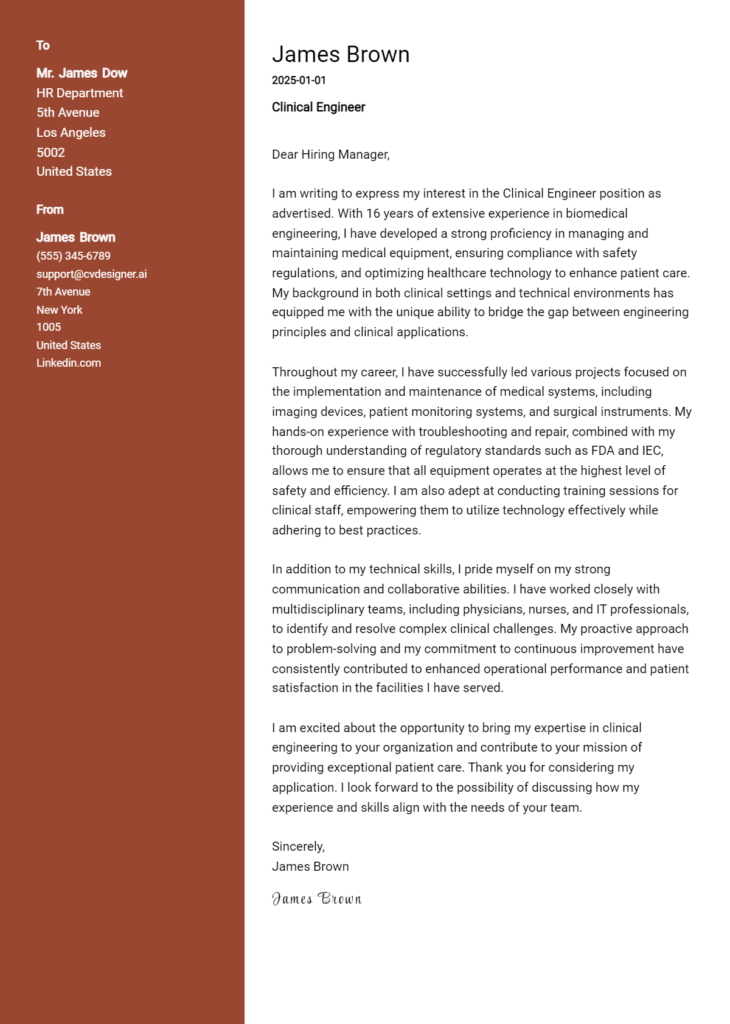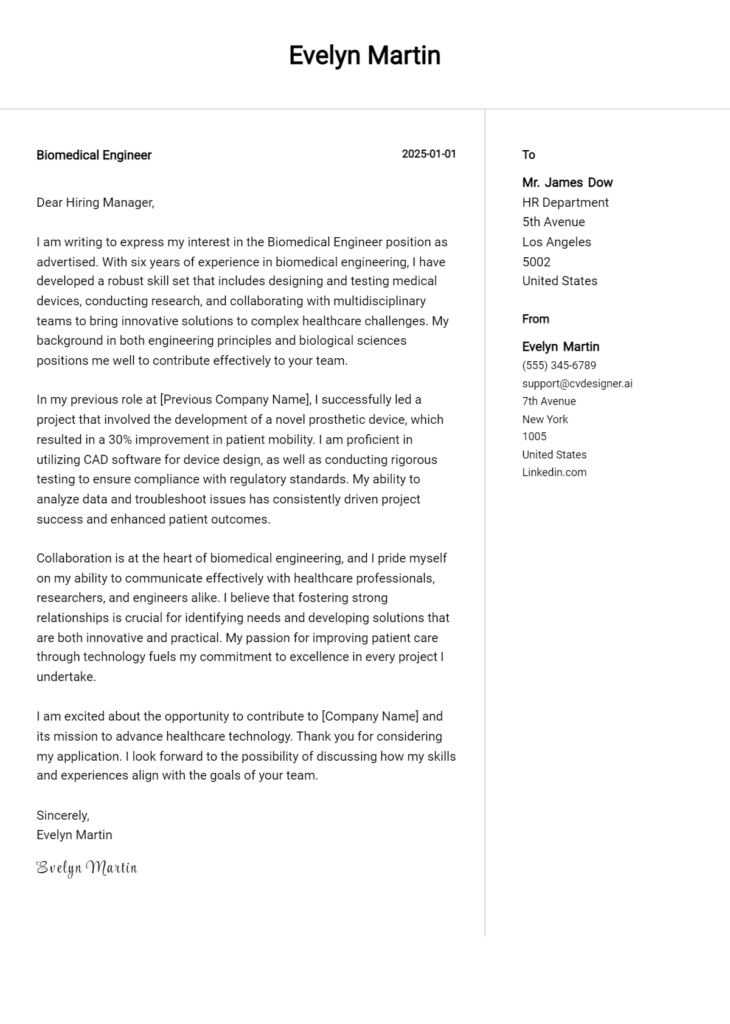Clinical Engineer 2 Cover Letter Examples
Explore additional Clinical Engineer 2 cover letter samples and guides and see what works for your level of experience or role.
How to Format a Clinical Engineer Cover Letter?
Crafting a compelling cover letter is crucial for Clinical Engineers, as it serves as your first opportunity to showcase your technical expertise and problem-solving abilities. The formatting of your cover letter not only reflects your professionalism but also your attention to detail—an essential trait in the healthcare technology field. A well-structured cover letter helps you stand out to hiring managers by emphasizing your qualifications and aligning them with the specific needs of the organization.
In this guide, we'll outline the key components of an effective cover letter, providing insights and examples tailored for Clinical Engineers.
We'll focus on the essential elements, including:
- Cover Letter Header
- Cover Letter Greeting
- Cover Letter Introduction
- Cover Letter Body
- Cover Letter Closing
Each section is vital in presenting your skills and experiences in a clear and engaging manner. Let’s delve into the specifics on how to create a standout cover letter for your Clinical Engineering career.
Importance of the Cover Letter Header for a Clinical Engineer
The cover letter header is a crucial element of your job application as a Clinical Engineer. It sets the tone for the entire letter and presents your professionalism right from the start. A well-structured header should include your contact information, the date, and the recipient's details. This not only provides clarity for the reader but also ensures that your application is easily traceable. A clear and professional header can make a positive impression, showcasing your attention to detail and organizational skills, which are vital in the clinical engineering field.
Strong Example
John Doe 1234 Main Street Anytown, ST 12345 (123) 456-7890 johndoe@email.com October 1, 2023 Mary Smith Hiring Manager XYZ Medical Technologies 5678 Elm Street Othertown, ST 67890
Weak Example
John D. 1234 Main 10-01-23 To Whom It May Concern,
The Importance of a Thoughtful Cover Letter Greeting
The greeting of a cover letter is crucial as it sets the tone for the entire correspondence. A well-crafted greeting demonstrates both professionalism and personalization, showcasing your attention to detail and respect for the hiring manager. By addressing the recipient directly, you create a connection that can make your application stand out. To avoid generic greetings like "To Whom It May Concern," take the time to research the name of the hiring manager or the person responsible for the recruitment process. This small effort can significantly enhance the impact of your cover letter.
Here are examples of strong and weak greetings for a Clinical Engineer cover letter:
Strong Example
Dear Dr. Smith,
Weak Example
To Whom It May Concern,
Cover Letter Introduction for Clinical Engineer
A well-crafted cover letter introduction is crucial for a Clinical Engineer, as it serves as the first impression to the hiring manager. This brief yet impactful section should capture attention, convey genuine interest in the role, and highlight key skills or relevant achievements that align with the position. A strong introduction can differentiate a candidate from others, setting the tone for the rest of the application. Below are examples of both effective and less effective introductions.
Strong Example
Dear [Hiring Manager's Name], As a dedicated Clinical Engineer with over five years of experience in the medical technology field, I am excited to apply for the Clinical Engineer position at [Company Name]. My background in managing complex medical equipment and my passion for enhancing patient care through innovative solutions have equipped me with the unique skills necessary to excel in this role. I am drawn to [Company Name]’s commitment to advancing healthcare technologies, and I am eager to contribute my expertise in biomedical engineering and regulatory compliance to your esteemed team.
Weak Example
To whom it may concern, I am writing to apply for the Clinical Engineer job you posted. I have some experience in the field and I think I could do a decent job. I am interested in working with your company because it seems like a nice place to work. I hope to discuss my qualifications further.
Purpose of the Cover Letter Body for a Clinical Engineer
The cover letter body for a Clinical Engineer serves as a crucial platform to highlight the candidate's relevant skills, experiences, and the unique value they bring to the prospective employer. This section allows the applicant to showcase specific projects or accomplishments that demonstrate their expertise in medical technology, problem-solving abilities, and teamwork. By detailing past experiences, such as successful implementations of biomedical equipment or contributions to clinical trials, candidates can effectively illustrate their qualifications and align their capabilities with the needs of the organization. A well-crafted cover letter body can significantly impact hiring decisions, making it essential for candidates to present their best attributes compellingly.
Strong Example
Dear Hiring Manager, I am excited to apply for the Clinical Engineer position at XYZ Healthcare. In my previous role at ABC Medical Solutions, I led a project to implement a new patient monitoring system across multiple departments, which resulted in a 30% reduction in equipment downtime. Additionally, I collaborated with a multidisciplinary team to design a training program for staff, enhancing their proficiency with the new system. My technical background, combined with my passion for improving patient care through innovative technology, makes me an ideal candidate for this role. I am eager to bring my expertise in medical device management and regulatory compliance to your esteemed organization. Sincerely, [Your Name]
Weak Example
To Whom It May Concern, I am interested in the Clinical Engineer position. I have worked in healthcare for several years and have some experience with equipment. I believe I can contribute to your team. I have done a few projects, but I am not sure of the details. I hope to learn more about your organization and be part of it. Best, [Your Name]
Importance of the Cover Letter Closing for a Clinical Engineer
The closing paragraph of a cover letter is crucial as it leaves a lasting impression on the hiring manager. For a Clinical Engineer, this section should succinctly summarize your qualifications, reaffirm your enthusiasm for the position, and encourage the reader to take the next steps, such as reviewing your resume or scheduling an interview. A strong closing can effectively reinforce your fit for the role, while a weak one may leave the reader uncertain about your interest or qualifications.
Strong Example
Thank you for considering my application for the Clinical Engineer position. With my extensive background in biomedical engineering and hands-on experience with medical devices, I am confident in my ability to contribute effectively to your team. I am particularly excited about the opportunity to enhance patient care through innovative technology at [Company Name]. I look forward to discussing how my skills and passion align with your needs. Please feel free to review my resume, and I hope to schedule an interview soon.
Weak Example
I think I would be okay for this job. My resume is attached, so you can look at it if you want. I hope to hear from you sometime.
Crafting an effective cover letter for a Clinical Engineer position is crucial in showcasing your unique qualifications and passion for the role. A well-written cover letter not only highlights your technical skills and problem-solving abilities but also demonstrates your understanding of the software development life cycle (SDLC), your capacity for teamwork, and your commitment to continuous learning. Below are five detailed tips to help you create a compelling cover letter that stands out to potential employers.
Tips for Writing a Cover Letter for Clinical Engineer
Highlight Your Technical Skills: Begin by showcasing your relevant technical skills. Mention specific medical devices or technologies you have experience with, such as imaging systems, patient monitoring equipment, or software used in biomedical applications. Providing quantifiable achievements or projects where you successfully utilized these skills can enhance your credibility.
Demonstrate Problem-Solving Abilities: Clinical Engineers often face complex challenges. Use your cover letter to illustrate your problem-solving capabilities. Share an example of a challenging situation you encountered in a clinical setting and detail how you approached the problem, the solution you implemented, and the positive outcome that resulted. This narrative will demonstrate your analytical skills and resilience.
Showcase Your Understanding of SDLC: Employers value Clinical Engineers who are familiar with the software development life cycle (SDLC). Briefly explain your understanding of SDLC stages and how you have contributed to projects at each phase, from requirements gathering to testing and deployment. This knowledge signals your ability to work effectively in multidisciplinary teams and contribute to successful project outcomes.
Emphasize Teamwork and Collaboration: Highlight your experience working in collaborative environments. Clinical Engineers often work alongside healthcare professionals, IT staff, and regulatory bodies. Provide examples of how you have effectively communicated and collaborated with others to achieve common goals. This shows potential employers that you can thrive in a team-oriented setting.
Express Passion for Continuous Learning: The healthcare technology field is ever-evolving, making continuous learning essential. Convey your enthusiasm for staying updated with the latest advancements in medical technology and engineering practices. Mention any relevant certifications, workshops, or courses you have pursued to enhance your knowledge, and express your commitment to ongoing professional development.
By following these tips, you can create a strong cover letter that effectively communicates your qualifications and enthusiasm for the Clinical Engineer role. For additional resources, consider exploring cover letter templates and using a cover letter builder to simplify the process.
Common Mistakes to Avoid in a Clinical Engineer Cover Letter
Crafting a compelling cover letter is essential for making a strong impression as a Clinical Engineer. Avoiding common mistakes can significantly enhance your chances of landing an interview. Here are some prevalent errors to watch out for, along with tips to steer clear of them:
Generic Content: Using a one-size-fits-all approach can make your cover letter forgettable. Tailor your letter for each position by highlighting relevant skills and experiences specific to the role and organization.
Ignoring the Job Description: Failing to reference the job description can lead to missed opportunities to showcase your fit for the role. Carefully read the requirements and incorporate keywords and phrases from the listing into your letter.
Overly Technical Language: While it's important to demonstrate your expertise, using excessive jargon can alienate hiring managers. Aim for clarity by explaining complex concepts in simple terms.
Lack of Personalization: Not addressing the letter to a specific person can come off as impersonal. Whenever possible, find the hiring manager's name to make your salutation more engaging.
Neglecting Formatting: A cluttered or unprofessional format can detract from your message. Follow a clear cover letter format to ensure your letter is easy to read and visually appealing.
Failure to Proofread: Spelling and grammatical errors can undermine your credibility. Always proofread your letter and consider having someone else review it to catch mistakes you might have missed.
Not Including a Call to Action: Concluding your letter without a strong call to action can miss an opportunity to express your eagerness for the position. End with a statement that invites further discussion or an interview.
By being mindful of these common pitfalls, you can create a cover letter that stands out and effectively showcases your qualifications. For inspiration, check out some cover letter examples to guide you in your writing process.
Cover Letter FAQs for Clinical Engineer
What should I include in my cover letter for a Clinical Engineer position?
In your cover letter, begin with a strong introduction that captures your enthusiasm for the role and briefly states your qualifications. Highlight your relevant education, such as a degree in biomedical engineering, and any certifications you hold. Discuss your experience with medical devices, systems maintenance, and regulatory compliance. Emphasize your problem-solving skills and how you have contributed to improving patient care or operational efficiency in previous roles. Conclude by expressing your eagerness to bring your technical expertise and collaborative spirit to the prospective employer's team.
How can I tailor my cover letter for a specific Clinical Engineer job?
To tailor your cover letter, carefully read the job description and identify key skills and experiences they are seeking. Use specific language from the listing to show you understand the company's needs. For example, if they emphasize experience with a particular type of medical equipment, provide examples of your hands-on experience with that technology. Additionally, research the organization to understand its values and goals, and align your qualifications with their mission. This targeted approach will help you stand out as a candidate who is a perfect fit for the role.
How long should my cover letter be for a Clinical Engineer application?
Your cover letter should ideally be one page long, containing three to four paragraphs. Aim for a concise and clear format, typically around 250-400 words. Start with a brief introduction, followed by a paragraph detailing your relevant experience and skills. In a third paragraph, illustrate how your background aligns with the specific needs of the organization. Finally, conclude with a strong closing statement that reiterates your interest in the position and invites the reader to discuss your application further. Keeping it succinct ensures that hiring managers will read your letter in its entirety.
Is it necessary to include technical skills in my cover letter?
Yes, including technical skills in your cover letter is essential for a Clinical Engineer position. Employers look for candidates who possess specific competencies, such as knowledge of medical device regulations, proficiency in systems integration, and familiarity with clinical workflows. Highlight your experience with particular medical technologies, software, or regulatory standards, such as FDA compliance. Additionally, mention any hands-on experience with troubleshooting and maintaining medical equipment. By showcasing your technical skills, you demonstrate your ability to contribute effectively to their team and ensure that you meet the demands of the role.
Build your Cover Letter in minutes
Use an AI-powered cover letter builder and have your letter done in 5 minutes. Just select your template and our software will guide you through the process.

